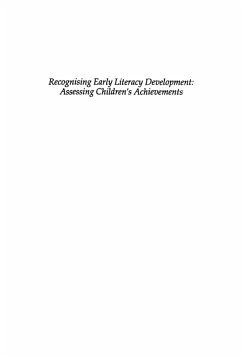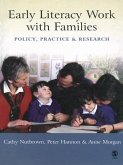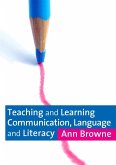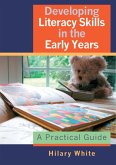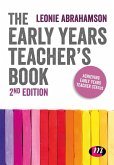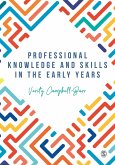`This book examines the literacy development and assessment of children before the age of five years. It is highly relevant to all those professionally involved in assessment. Cathy Nutbrown explores the need for appropriate assessment practice to support teachers and illustrates the mismatch between the way teachers and researchers assess literacy. The book is worth buying for the final chapter alone, which provides an analysis of the newly developed Sheffield Early Literacy Development Profile. The actual tasks are included in the appendices. Thus, Cathy Nutbrown does not leave us frustrated. We are able to consider an ongoing assessment which is in tune with the best practice in teaching.
This is a research text which balances theory with practical realism. It is particularly relevant today with the introduction of Baseline Assessment. Teachers and researchers will find much that they can relate to and learn from. It is clearly written and deserves to be widely read. However, it may make for uncomfortable reading as Cathy Nutbrown challenges all concerned with the assessment of early literacy development to reflect on exactly what they are doing and why' - British Educational Research
Recognising Early Literacy Development presents a new view of the many purposes of assessment in early literacy development. Issues in early literacy assessment, current assessment material, the purposes of literacy assessment, government policy, practice in schools, baseline assessment of literacy, the need for new research measures of early literacy, are all recurrent themes of the book. The author reviews and discusses three decades of policy and practice in assessing literacy development in the years 3 to 5 - from recognising in the late 1960s that literacy in these years exists, to proposals in 1997 for official assessment of literacy at 5 years.
This is a research text which balances theory with practical realism. It is particularly relevant today with the introduction of Baseline Assessment. Teachers and researchers will find much that they can relate to and learn from. It is clearly written and deserves to be widely read. However, it may make for uncomfortable reading as Cathy Nutbrown challenges all concerned with the assessment of early literacy development to reflect on exactly what they are doing and why' - British Educational Research
Recognising Early Literacy Development presents a new view of the many purposes of assessment in early literacy development. Issues in early literacy assessment, current assessment material, the purposes of literacy assessment, government policy, practice in schools, baseline assessment of literacy, the need for new research measures of early literacy, are all recurrent themes of the book. The author reviews and discusses three decades of policy and practice in assessing literacy development in the years 3 to 5 - from recognising in the late 1960s that literacy in these years exists, to proposals in 1997 for official assessment of literacy at 5 years.
Dieser Download kann aus rechtlichen Gründen nur mit Rechnungsadresse in A, D ausgeliefert werden.
`This is a research text which balances theory with practical realism. It is particularly relevant today with the introduction of Baseline Assessment. Teachers and researchers will find much that they can relate to and learn from. It is clearly written and deserves to be widely read. However, it may make for uncomfortable reading as Cathy Nutbrown challenges all concerned with the assessment of early literacy development to reflect on exactly what they are doing and why' - British Educational Research

